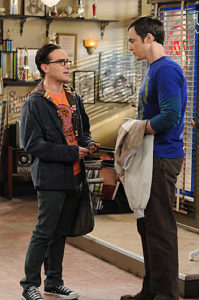
In the CBS television series The Big Bang Theory, gifted physicist Sheldon Cooper is the center of a social group composed mainly of academics and intellectuals. This social circle includes his roommate and experimental physicist Leonard Hofstadter, aerospace engineer Howard Wolowitz, microbiologist Bernadette Rostenkowski-Wolowitz, astrophysicist Raj Koothrappali, girlfriend and neuroscientist Amy Farrah Fowler, and his neighbor – a waitress and struggling actress named Penny.
Sheldon has an unusual relationship to the others within his social circle. He makes it a point to remind them that he is the most intellectually gifted person within the group. Sheldon frequently suggests that Leonard’s research and academic accomplishments pale in comparison to his own. He also rarely misses an opportunity to point out that Howard never obtained a doctoral degree. He even orchestrated a fellowship whereby Raj was forced to work in a subordinate role to him.
The women within the group are given equal treatment. When his girlfriend Amy suggested that her field of study might be more important than his own, Sheldon terminated his relationship with her. He also condescendingly reminds his neighbor Penny of her intellectual shortcomings in comparison to himself and the rest of the group as well as her disappointing status as a Cheesecake Factory waitress. From the episode The Gorilla Experiment:
Sheldon: Why are you crying?
Penny: Because I’m stupid!
Sheldon: That’s no reason to cry. One cries because one is sad. For example, I cry because others are stupid, and that makes me sad.
Considering how Sheldon tends to treat his friends, it is peculiar that he chooses to remain within a group of people he feels are intellectually inferior. One would naturally expect him to seek out a true intellectual peer group, yet he does not. One theory that can explain why Sheldon remains within this particular group is the Big-Fish-Little-Pond Effect.
What is the Big Fish in a Little Pond Effect?
The Big-Fish-Little-Pond Effect is a concept first postulated by psychologists Herbert W. Marsh and John W. Parker in 1984.1 According to Marsh, Parker, and subsequent theorists, the academic self-concept of gifted individuals suffers when they are placed in an environment where their peers are of equal or more advanced intelligence and ability. “In plain language,” writes educational psychologists David Yun Dai and Anne N. Rinn, “whether one perceives oneself as a big fish depends on the size of the other fish (more accurately the average size of the other fish) in the pond. The stronger the peer group as a frame of reference, the lower one’s academic self-concept. By the same token, weaker peer groups lead to higher academic self-concepts.”2
While this theoretical concept is most commonly applied to academic placement, it is worth considering whether the effect extends to social and professional peer groups, where gifted individuals have more freedom to choose their associations. Is it possible that Sheldon Cooper has crafted a social circle to combat negative self-perception and maintain his high academic self-concept; a social circle where he does not feel his intellectual superiority is threatened and his accomplishments are exceptional by comparison?
Is Sheldon the Big Fish in his Little Pond?
Sheldon Cooper struggles for recognition in his field. Even at his own university, Sheldon tends not to associate with those outside his social group and is at odds with fellow researchers and the university administration.
While Sheldon feels he is deserving of a Nobel Prize, it remains elusive. He is frustrated that he has yet to develop any great advancements in his field. And a lack of recognition at his university seems to also generate resentment. From the episode The Pants Alternative:
Leonard: So I was just at the Dean’s office and I overheard them discuss the winner of the Chancellor’s Award for Physics this year.
Sheldon: And you’ve come to rub my nose in it. I’m the William Shatner of theoretical physics. All right, I’ll play along. What self-important preening fraud are they honoring this year?
Leonard: I’m so glad you ask it like that. You.
Sheldon: I won?
Leonard: You won.
Sheldon: I won! This is astonishing. Not that I won the award, no one deserves it more. Actually, I guess I misspoke. It’s not astonishing, more like inevitable.
Over the course of the television series, Sheldon demonstrates his jealousy of more respected physicists and his envy of the reputations they’ve earned. He is both dismissive of their accomplishments and desirous of obtaining the same level of recognition. This dichotomy means that Sheldon eschews involvement in the greater community of his peers while also seeking to distinguish himself among them. He wants to excel, but is intimidated by the idea of being compared to his more competitive peers, so he avoids mainstreaming into his full intellectual peer group.

In the episode, The Cooper-Hofstadter Polarization, Sheldon and Leonard have the opportunity to present their co-authored paper to an audience of their intellectual and professional peers at the Institute of Theoretical Physics conference. However, without consulting Leonard, Sheldon throws the invitation out. Leonard, who later finds out about the invitation, asks Sheldon why he threw it out.
“Because I have no interest in standing in the Rose Room of the Pasadena Marriott in front of a group of judgmental strangers, who wouldn’t recognize true genius if it were standing in front of them giving a speech. Which, if I were there, it would be.”
Sheldon’s response, in addition to demonstrating more than a hint of narcissism, also suggested that he feared not being perceived as the alpha intellectual in the room. To give a presentation at the Institute of Theoretical Physics conference would mean entering into a peer group where Sheldon’s intelligence and achievements might not be the most significant – in fact, he might even appear average in comparison.
On the other hand, his tight social group continually validates Sheldon as an exceptional intellectual. And to maintain that validation, Sheldon, whether consciously or unconsciously, is quick to remind others of his status and reinforce the idea of his pre-eminence, usually through the use of condescension. For example, in the same conversation, Leonard sarcastically asks Sheldon if he was the recipient of any other honors, like a Nobel Prize, that Sheldon failed to mention, to which Sheldon quickly replied:
“Leonard, please don’t take this the wrong way, but the day you win a Nobel Prize is the day I begin my research on the drag coefficient of tassels on flying carpets.”
While the reason why Sheldon’s social peers tolerate his treatment of them is the subject for another day, it is clear that they do struggle with the issue, as evidenced by Leonard’s response to Sheldon’s Nobel Prize insult and his refusal to allow Leonard to present their paper at the conference. Leonard’s response reinforces the notion that Sheldon may have sought out a community where he was the smartest.
“I’ve had enough of your condescension. Maybe I didn’t go to college when I was eleven like you, maybe I got my doctorate at 24 instead of 16, but you are not the only person who is smarter than everyone else in this room. No offense. And I am clearly not the only person who is tormented by insecurity and has an ego in need of constant validation.”
It is interesting to point out a secondary motive for Sheldon’s refusal to allow Leonard to present at the conference (beyond his own unwillingness to attend). That is the possibility that Leonard might outshine him. In fact, a 1999 study by Frederic Guay, Michel Boivin, and Ernest Hodges suggested that academic self-concept is more negatively impacted by the higher average performance of close friends than it is by the higher average performance of larger peer groups.3 Leonard excelling may be more harmful to Sheldon’s academic self-concept than the judgment of an audience full of physicists.
Finally, there is the practical consideration. If Leonard receives recognition, that jeopardizes Sheldon’s place within the group and raises the average achievement level of their social circle. By preventing a disruption in the achievement level of the group, Sheldon can maintain the same level of effort required to remain on top.
Sheldon’s foothold on the role of alpha intellectual among his social group is always on shaky ground. In the episode The Jerusalem Duality, Sheldon and Leonard are introduced to Dennis Kim, an adolescent prodigy who seems to be every bit the equal of Sheldon, if not more. The impact on Sheldon’s academic self-concept is clear and immediate:
Leonard: Something you’d like to share? A tale of woe perhaps.
Sheldon: Fifteen years old. Dennis Kim is fifteen years old, and he’s already correcting my work. Today I went from being Wolfgang Amadeus Mozart to… you know, that other guy.
Howard: Antonio Salieri?
Sheldon: Oh, God, now even you’re smarter than me.
Conclusion
In the episode The Zazzy Substitution, Sheldon defines his role within his social circle. “They can’t function without me. I’m the social glue that holds this little group together.” The truth may be quite the opposite – it may be the group that serves Sheldon, by buoying his high academic self-concept and providing him the means to maintain an otherwise fragile ego.
The Big-Fish-Little-Pond Effect can explain why Dr. Sheldon Cooper elects to maintain his place within his small circle of friends. By maintaining primary association with this group, his academic self-concept is validated and his accomplishments appear exceptional in comparison.
Leonard: We need to widen our circle.
Sheldon: I have a very wide circle. I have 212 friends on MySpace.
Leonard: Yes, and you’ve never met one of them.
Sheldon: That’s the beauty of it.
Notes:
Marsh, H. W., & Parker, J. (1984). Determinants of student self-concept: Is it better to be a relatively large fish in a small pond even if you don’t learn to swim as well? Journal of Personality and Social Psychology, 47, 213–231.
Dai, D. Y., & Rinn, A. N. (2008). The big-fish-little-pond effect: What do we know and where do we go from here? Educational Psychology Review , 20, 283-317.
Guay, F., Boivin, M., & Hodges, E. V. E. (1999). Social comparison processes and academic achievement: The dependence of the development of self-evaluations on friends’ performance. Journal of Educational Psychology, 91(3), 564-568.
